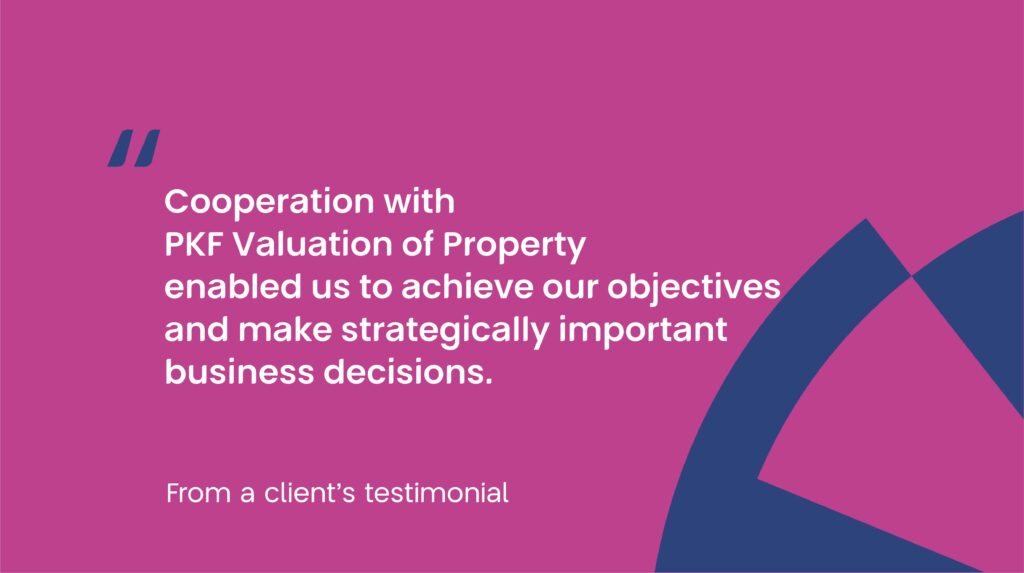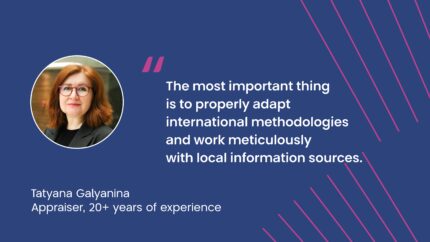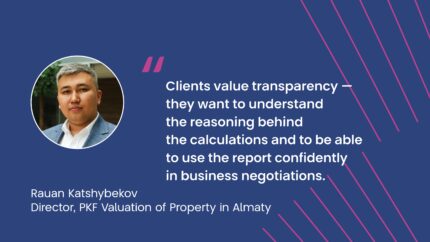Loan Valuation under IFRS in Kazakhstan: Insights from PKF Valuation of Property
2025.10.10In some cases, companies may perform debt valuation using internal methodologies — for instance, for internal management purposes, preliminary negotiations with investors, or during M&A (mergers and acquisitions) preparations, when the objective is simply to understand the company’s overall debt exposure. However, there are situations where financial reporting without compliance with International Financial Reporting Standards (IFRS) is simply not possible. This applies to the preparation of consolidated financial statements, audits, debt restructuring, or entering international capital markets.
Why Loan Valuation under IFRS Matters
- Valuing debt in line with IFRS enhances the transparency and comparability of financial reporting across different jurisdictions and industries.
- Accurate debt valuation helps assess risks associated with lending activities.
- Proper and timely valuation contributes to investor confidence, ensuring that the financial statements reflect the true economic position of the company.
The Process of Loan Valuation under IFRS
IFRS-based loan valuation primarily involves determining fair value or amortized cost, depending on the classification of the liability. These principles are set out in IFRS 9 and IFRS 13.
Key Aspects of Loan Valuation under IFRS:
1. Classification:
Under IFRS 9, debt instruments are classified into three categories:
– Amortized Cost
– Fair Value through Other Comprehensive Income (FVOCI)
– Fair Value through Profit or Loss (FVTPL)
2. Measurement Approaches:
– For debt measured at amortized cost, the effective interest rate method is used to calculate interest income and to evenly amortize any fees or transaction costs over the loan term.
– For debt measured at fair value, IFRS 13 requires prioritizing market quotations when available. In the absence of active market data, valuation models are applied using observable inputs wherever possible, minimizing subjective assumptions.
3. Impairment:
– IFRS 9 introduces the Expected Credit Loss (ECL) model, which applies to financial assets including loans. Under this approach, losses are recognized at the time of origination, not only when a default event occurs, providing a more timely reflection of credit risk.
PKF Valuation of Property’s Experience in Loan Valuation under IFRS
The PKF Valuation of Property team in Almaty successfully completed a loan valuation project for one of Kazakhstan’s major companies. The engagement required not only strong methodological expertise but also a deep understanding of the local market environment.
“When working with debt instruments under IFRS, we always face a key challenge: the Kazakhstani market does not provide the same depth of data that is readily available in Europe or the U.S. Therefore, the most important thing is to properly adapt international methodologies and work meticulously with local information sources. This approach allows us to achieve results that meet international audit requirements while reflecting the real economic situation of the business,” — notes Tatyana Galyanina, valuer at PKF Valuation of Property with over 20 years of professional experience.
“In every valuation project, not only methodology but also communication matters. Clients value transparency — they want to understand the reasoning behind the calculations and to be able to use the report confidently in business negotiations,” — emphasizes Rauan Katshybekov, Director of the PKF Valuation of Property office in Almaty.
The high professionalism of the team was also confirmed by client feedback: “We were highly satisfied with the company’s work”. In their recommendation letter, the client highlighted the team’s efficiency, organization, and responsiveness. According to the client, cooperation with PKF Valuation of Property enabled them to achieve their objectives and make strategically important business decisions.
What to Consider When Choosing a Valuation Company for IFRS Loan Valuation
Valuing debt under IFRS comes with a number of challenges — lack of market quotations, reliance on assumptions and professional judgment, low liquidity, extensive disclosure requirements, calibration difficulties, differences in interpretation of standards, market volatility, and the need for deep professional expertise. These factors make the valuation process complex and demanding.
Therefore, obtaining an objective and reliable loan valuation requires partnering with an appraiser or valuation firm that understands these challenges and knows how to address them effectively.
The appraiser’s role is to ensure objectivity, accuracy, and compliance with standards. The main professional benchmarks include:
- independence and impartiality of conclusions;
- application of professional judgment when data is limited;
- critical testing of management assumptions and forecasts;
- thorough documentation and adherence to regulatory requirements;
- ability to adapt to evolving standards and changing market conditions.
“It’s essential to maintain open communication channels with auditors. Our goal is not only to deliver a report but to make it clear, well-supported, and audit-ready,” — adds Tatyana Galyanina, valuer at PKF Valuation of Property.
“In Kazakhstan, we also account for currency risks: a portion of corporate debt is denominated in foreign currencies, and fluctuations in the tenge exchange rate have a direct impact on the valuation of obligations,” — she concludes.

Loan valuation under IFRS is a process that requires not only a deep understanding of international standards but also their careful adaptation to the Kazakhstani context. The PKF Valuation of Property team combines both — delivering transparent, practical results that clients can rely on for strategic decision-making.
Want to discuss loan valuation for your company? Fill out the form below — our specialists will contact you shortly.


